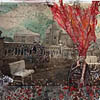 The promise of Fire on Fire's debut EP on Young God is easily met by their dream-like, somnambulistic follow-up. Less extravagant and aggressive than their previous effort, this Portland Maine-based quintet showcases their softer side with rich and mellow songwriting cut through by pining voices and twang-scored harmonies.
The promise of Fire on Fire's debut EP on Young God is easily met by their dream-like, somnambulistic follow-up. Less extravagant and aggressive than their previous effort, this Portland Maine-based quintet showcases their softer side with rich and mellow songwriting cut through by pining voices and twang-scored harmonies.
When I heard Fire on Fire's "Amnesia" (from their EP), I was won over by the psychedelic madness that boiled beneath the song's tuneful hook and bizarre lyrics. The band manifested a crazed energy within the confines of their nuanced songwriting and constantly teetered on the brink of chaos. The Orchard sees the band relaxing and focusing their energy on softer tunes and strengthening their songwriting core. With nothing but acoustic instruments at their disposal, the group recalls the spirit of America's early musical tradition by emphasizing strong lyrical topics and melody-heavy songs. Drunken and haphazard frills decorate the record and keep many of the songs from sinking into pure genre worship. This is not slick, romantic Appalachia; Fire on Fire are rugged and lively musicians who emphasize lurching movements and uneven steps.
The album begins with "Sirocco," perhaps the most rock-like song of the 12 featured on the album. The name comes from the high velocity winds that blow out of the Sahara and pelt France, Italy, and Greece across the Mediterranean. This hurricane-strength wind can disable machinery and invade homes as it blows north and dissipates. "Sirocco" takes its namesake seriously and functions as the album's vital genesis; it is far and away the most energetic song on the album and it propels the record forward with a haphazard bang. Reveling in fragility and decay, the band boldly announce their purpose: "If we tear this kingdom down / Tear it down / Let it be with a deserving and joyous sound." To this end, Fire on Fire employ rambling banjos, scruffy yelps, soothing harmonies, and the familiar sounds of the strummed guitar. They add quirky lyrics, unexpected twists, and exotic nuances to facilitate a hallucinatory sound. Some songs play out in prismatic shifts with uneasy contrasts and others resemble traditional American folk songs as imagined by The Byrds, but at no point does the group allow their songs to fall into an easily definable space. One of the album's highlights, "Toknight," is an almost-believable country/pop hybrid from the late '60s or early '70s. The song's heavy down-beat, plodding rhythm, huge chorus, and subject matter are all drawn from country and rock roots, but I doubt anyone would confuse Fire on Fire with Gram Parsons. Gypsy music seems an equal part of the band's formula, though that may only be an effect of the accordion's prominent position in many of the songs. The band's approach to performance is grounded in a familiar and well-established tradition, but their vision of American music isn't purely historical nor is it purely American.
In fact, an other-worldly quality permeates The Orchard from top to bottom. Collenen Kinsella's voice is a particularly sharp and effective part of the band's sound; her unusual abilities add an absolutely invaluable dimension to the band's timbre and provides some of the stranger songs their strangest edges. It is the use of unusual vocal harmonies and textures that gives many of these songs their unusual character. The vocal performances bare a tribal and spontaneous quality that alters the nature of the music being played and ultimately forms the heart of the record. In any case, Fire on Fire's music is an inventive take on old music; they've adhered to a simple premise and thankfully managed to strike new ground without venturing too far into "freak folk" territory. This is undeniably American music, but with Fire on Fire's distinct and eccentric signature.
samples:
Read More

